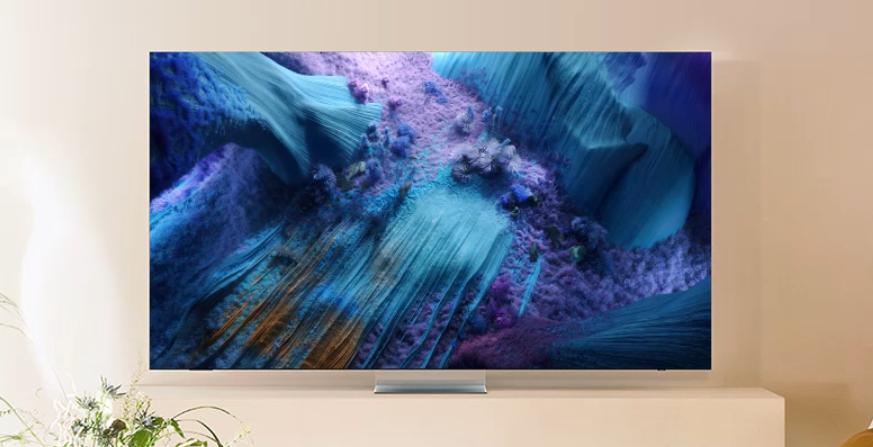
Your beloved Samsung TV, once a seamless entertainment hub, now seems sluggish and unresponsive. This issue could stem from various factors, dulling your viewing experience and causing frustration. Although smart TVs are immensely versatile, several issues can compromise their performance. In this blog, we’ll delve into the common causes of a slow Samsung TV, providing practical solutions to restore its speed. You’ll learn about software updates, cache management, and network optimization. Additionally, we’ll help you determine when a factory reset or upgrade might be necessary. Read on to unveil the secrets to enhance your smart TV’s performance effortlessly.

What Causes a Smart TV to Run Slow?
Outdated Software and Firmware
Outdated software and firmware can significantly slow down your Samsung TV. The manufacturer frequently releases updates to enhance performance, fix bugs, and improve security. However, ignoring these updates may lead to compatibility issues, resulting in sluggishness. Your TV might struggle to support newer apps or features that require the latest version. Therefore, staying current with software updates is crucial. Regular updating ensures your smart TV operates with full efficiency. This action not only rectifies existing problems but also prevents new ones from arising. By keeping your TV’s software fresh, you pave the way for smoother operation and optimal performance.
Insufficient Storage and Overloaded Cache
Over time, downloading apps and storing media files can clutter your TV’s storage, leading to performance dips. Each app accumulates cache, temporary files, aiming to speed up processes. Unfortunately, when this cache piles up excessively, it can have the opposite effect, slowing device operation. Running low on storage space may prevent crucial updates and affect multitasking capabilities. Regular maintenance is necessary to ensure your TV has the space to breathe. Deleting unnecessary apps, clearing caches, and managing storage effectively will contribute significantly to rejuvenating your television’s speed and responsiveness.
Weak or Unstable Internet Connection
A slow or unstable internet connection can directly impact your Samsung smart TV’s performance, especially with streaming content or downloading apps. If your TV is competing with multiple devices for bandwidth, it may not receive adequate speed. Additionally, the distance from your router and possible interference from other electronic devices can weaken the signal. Even hot weather or poor staking can affect your TV’s internet performance. Enhancing your network’s speed and ensuring a stable connection is pivotal. Transitioning to a wired connection, upgrading to a powerful router, or rearranging your setup can markedly enhance performance.

How to Fix a Slow Smart TV
Perform a Cold Boot to Clear Memory Cache
A cold boot, unlike regular standby mode, completely shuts down your TV, helping clear its memory cache and reset operations. This action is a straightforward way to boost performance. To perform a cold boot, press and hold the power button on your remote until the TV restarts. This process removes temporary files clogging the system, essentially giving your TV a fresh start. Cold booting once a month or whenever you notice a slowdown can prevent significant performance issues, ensuring that your television operates at its optimal speed without unnecessary lag.
Clear App Cache and Manage Storage
Managing storage and clearing the app cache are imperative to boost your Samsung TV’s speed. Navigate to your TV’s settings to individually clear caches for each app, which helps free up valuable memory. Uninstalling seldom-used apps also optimizes storage, allowing essential applications to perform better. Regular storage management circumvents performance drops due to inadequate space. Having adequate storage space available is essential for receiving updates and running applications smoothly. Essentially, a cleaner, leaner system will contribute to enhanced performance and ensure your viewing sessions remain uninterrupted and enjoyable.
Optimize Network Settings for Better Performance
Improving network settings can significantly enhance your TV’s performance. Begin by conducting a speed test to verify your current internet connection. Should you find the speed lacking, consider a wired connection for stability. Ensure your router’s settings are optimized for your TV, and position it to minimize obstruction and interference. You can also update your router’s firmware for improved bandwidth management. By prioritizing your TV in the network settings, you allow it to operate more reliably. This optimization helps reduce buffering and improves app loading times, contributing to a far smoother viewing experience.
When to Consider a Factory Reset or Upgrade
If persistent sluggishness plagues your smart TV despite trying various solutions, it might be time for a factory reset or upgrade. A factory reset erases all data, returning the TV to its original state. This drastic step is beneficial if software glitches or other anomalies prevail. However, if your television is outdated and incapable of supporting modern apps or updates, considering a new model might be wise. Newer televisions are equipped with advanced technology designed for efficiency and speed. Weigh the options carefully to make a decision that enhances your viewing satisfaction in the long term.
Conclusion
Revitalizing a slow Samsung TV is achievable with appropriate action. By regularly updating software, managing cache and storage, and optimizing your network, you enhance performance remarkably. Simple tactics like a cold boot or a well-timed factory reset can work wonders. Although an upgrade might be necessary for dated models, these steps suffice for maintaining optimal speed. Prioritize routine maintenance, stay ahead of potential issues. Your smart TV, with its renewed agility, promises seamless entertainment once again, bringing shows, movies, and apps to life without the baggage of unnecessary lag.
FAQ
Why Does My Samsung TV Lag When Streaming Apps?
Your Samsung TV may lag during app streaming due to factors like insufficient internet speed or high app cache accumulation. Verifying your internet speed and stability is essential, as lagging often stems from weak connections. Clearing app caches and ensuring your TV firmware is updated can also resolve streaming issues. These actions eliminate possible roadblocks, ensuring your smart TV streams content seamlessly without disruptive lag.
How Often Should I Update My Smart TV’s Software?
Updating your smart TV’s software every month or as soon as updates become available is recommended. These updates contain important bug fixes, enhancements, and security patches essential for maintaining performance and functionality. Staying updated ensures compatibility with the latest applications and features, safeguarding your television against potential vulnerabilities. Maintaining a regular update schedule is pivotal for a seamless viewing experience.
Is It Safe to Cache the App on My Smart TV?
Yes, clearing app cache on your smart TV is safe and beneficial. This process removes temporary files accumulated by apps, thereby freeing up storage space and enhancing performance. Regular cache clearing prevents your television from becoming sluggish due to excessive data storage. It’s a safe and effective measure to ensure that applications run efficiently without unnecessary data slowing them down.
Leave a Comment